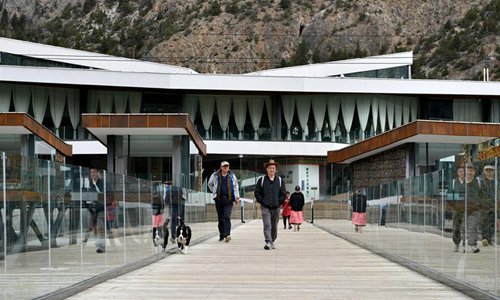HOME >> CHINA
US 'blind’ to China’s help for Tibet Autonomous Region
By Yang Sheng Source:Global Times Published: 2019/5/26 21:03:05
Stable region makes American politicians nervous: analysts

People visit the Ra'og international road-trip and RV camping base of Baxoi county, in Qamdo, Southwest China's Tibet Autonomous Region, May 24. The camping base is expected to help 60 local poor families increase their income. Photo: Xinhua
As his trip to Tibet ended Saturday, US Ambassador to China Terry Branstad made unconstructive remarks that interfered with China's internal affairs, Chinese observers noted Sunday, saying that the US is blind to the successful development of the region.
Branstad charged the Chinese government to engage in "substantive dialogue" with the exiled 14th Dalai Lama after finishing his week-long visit, said a spokesperson of the US Embassy to China, the Voice of America reported on Saturday.
"There is no room for the US to lecture the Chinese government on how to deal with China's internal affairs," said Zhu Weiqun, former head of the Ethnic and Religious Affairs Committee of the National Committee of the Chinese People's Political Consultative Conference.
"About 'substantive dialogue' with the Dalai Lama, we have to make it clear that the dialogue is between the central government of a country and the head of a regional separatist clique. So Tibet's sovereignty and governance are not negotiable at all. The purpose of the talk is to make the Dalai Lama abandon separatism," Zhu said.
The central government has sent representatives to engage with the Dalai Lama's personal representatives 10 times from 2002-10, but the Dalai Lama just "refused to correct his mistake and even incited and organized multiple violent and self-burning incidents in Tibet to damage the stability and development of the region…This is why we suspended dialogue with him," he said.
If the US believes that "substantive dialogue" means compromising on Tibet's sovereignty, then neither the Chinese government nor the Chinese people will agree with such a dialogue, Zhu said.
Branstad also "expressed concerns regarding the Chinese government's interference in Tibetan Buddhists' freedom to organize and practice their religion," an embassy statement said.
China showed its sincerity to maintain or improve its ties with the US by permitting the US envoy to visit Southwest China's Tibet Autonomous Region and offering him a valuable chance to see the development of Tibet with his own eyes, Zhu said.
Diao Daming, an assistant professor at Renmin University of China, said "allowing the request from the US side shows that China has confidence to show a beautiful and stable Tibet to the world and it has nothing to hide."
Branstad should improve mutual understanding and respect between the two countries, but unfortunately, his disappointed comments about Tibet after his trip were "very unconstructive to bilateral ties," said Lü Xiang, a research fellow on China-US relations at the Chinese Academy of Social Sciences in Beijing.
"The US is still being blind to what we achieved in the region and still wants to interfere in China's internal affairs and is even trying to damage the stability of the region," Zhu said.
On May 20, Chinese Foreign Ministry Spokesperson Lu Kang said at a regular press conference that China hopes Branstad could draw his own conclusions based on respecting facts without prejudice, instead of being deluded or disturbed by hearsay or speeches, especially on the protection of Tibetan culture and religion.
"We don't expect some US politicians to change their bias on China's Tibet through showing facts to them, because for some US politicians," said Zhu, adding that they just want to make Tibet unstable and use this to contain China, which means the more stable and prosperous Tibet, the more nervous and unhappy some US politicians.
"Ambassador Branstad previously served as governor of Iowa and farmers in Iowa are suffering the consequences caused by the Trump administration's ridiculous trade policy, so should he think more about how to help his people rather than making remarks that interfere with China's internal affairs." Lü said
Newspaper headline: US ‘blind’ to China’s help for Tibet region
Posted in: POLITICS,CHINA FOCUS